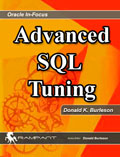Question: How do understand the
working of a SORT JOIN operation. I have an execution
plan with the following plan:
--------------------------------------------------------------------------------------------------------------------------------------------
| Id | Operation | Name | Starts | E-Rows | A-Rows | A-Time
| Buffers | Reads | Writes | OMem | 1Mem | Used-Mem |
Used-Tmp|
-
---------------------------------------------------------------------------------------------------------------
| 0 | SELECT STATEMENT | | 1 | | 1 |00:15:29.75 | 3573K|
5013K| 568K| | | | |
| 1 | SORT AGGREGATE | | 1 | 1 | 1
|00:15:29.75 | 3573K| 5013K| 568K| | | | |
| 2 | MERGE
JOIN | | 1 | 192M| 192M|00:15:00.89 | 3573K| 5013K| 568K| |
| | |
| 3 | SORT JOIN | | 1
| 192M| 192M|00:10:22.83 | 3132K| 3607K| 475K| 4175M| 20M|
100M (1)| 3712K|
| 4 | TABLE ACCESS FULL| ORDERS | 1 |
192M| 192M|00:04:08.01 | 3132K| 3132K| 0 | | | | |
|* 5
| SORT JOIN | | 192M| 19M|
192M|00:03:20.64 | 440K| 1406K| 93446 | 411M| 6704K| 100M
(1)| |
| 6 | TABLE ACCESS FULL| CUSTOMER | 1 | 19M|
19M|00:00:34.02 | 440K| 440K| 0 | | | | |
--------------------------------------------------------------------------------------------------------------------------------------------
Answer: The Oracle use_merge
hint requests a sort join (a type of
sort merge join) against the specified tables.
As the name implies, a sort join reads both tables (via a
full-table scan) and then sorts the rows. The nest step is
merging the sorted tables into a single result set:

The use_merge hint forces a
sort merge operation. Make sure you run your sort join with
parallel query since you are doing full-table scans.
The sort merge operation is often
used in conjunction with parallel query because a sort merge
join always performs full-table scans against the tables.
Sort merge joins are generally best for queries that produce
very large result sets such as daily reports and table
detail summary queries, or tables that do not possess
indexes on the join keys.
Here we see a simple query that has
been formed to perform a sort join (use_merge)
using parallel query against both tables.
select /*+
use_merge(e,b) parallel(e, 4) parallel(b, 4) */
e.ename,
hiredate,
b.comm
from
emp
e,
bonus b
where
e.ename
= b.ename
;
Here is the output of the execution plan for
this query. Note the full-table scans and the sort merge
operation:
OPERATION
----------------------------------------------------------------------
OPTIONS OBJECT_NAME POSITION
------------------------------ ----------------------------
----------
SELECT STATEMENT
5
MERGE JOIN
1
PARALLEL_TO_SERIAL
SORT JOIN
1
PARALLEL_COMBINED_WITH_PARENT
TABLE ACCESS
FULL
EMP 1
PARALLEL_TO_PARALLEL
SORT JOIN 2
PARALLEL_COMBINED_WITH_PARENT
TABLE
ACCESS
FULL BONUS 1
PARALLEL_TO_PARALLEL
It is important to note that a sort
merge join does not use indexes to join the tables. In most
cases, index access is faster, but a sort merge join may be
appropriate for a large tale join without a where
clause, or in queries that do not have available indexes to
join the tables.
 |
|
Get the Complete
Oracle SQL Tuning Information
The landmark book
"Advanced Oracle
SQL Tuning The Definitive Reference" is
filled with valuable information on Oracle SQL Tuning.
This book includes scripts and tools to hypercharge Oracle 11g
performance and you can
buy it
for 30% off directly from the publisher.
|
